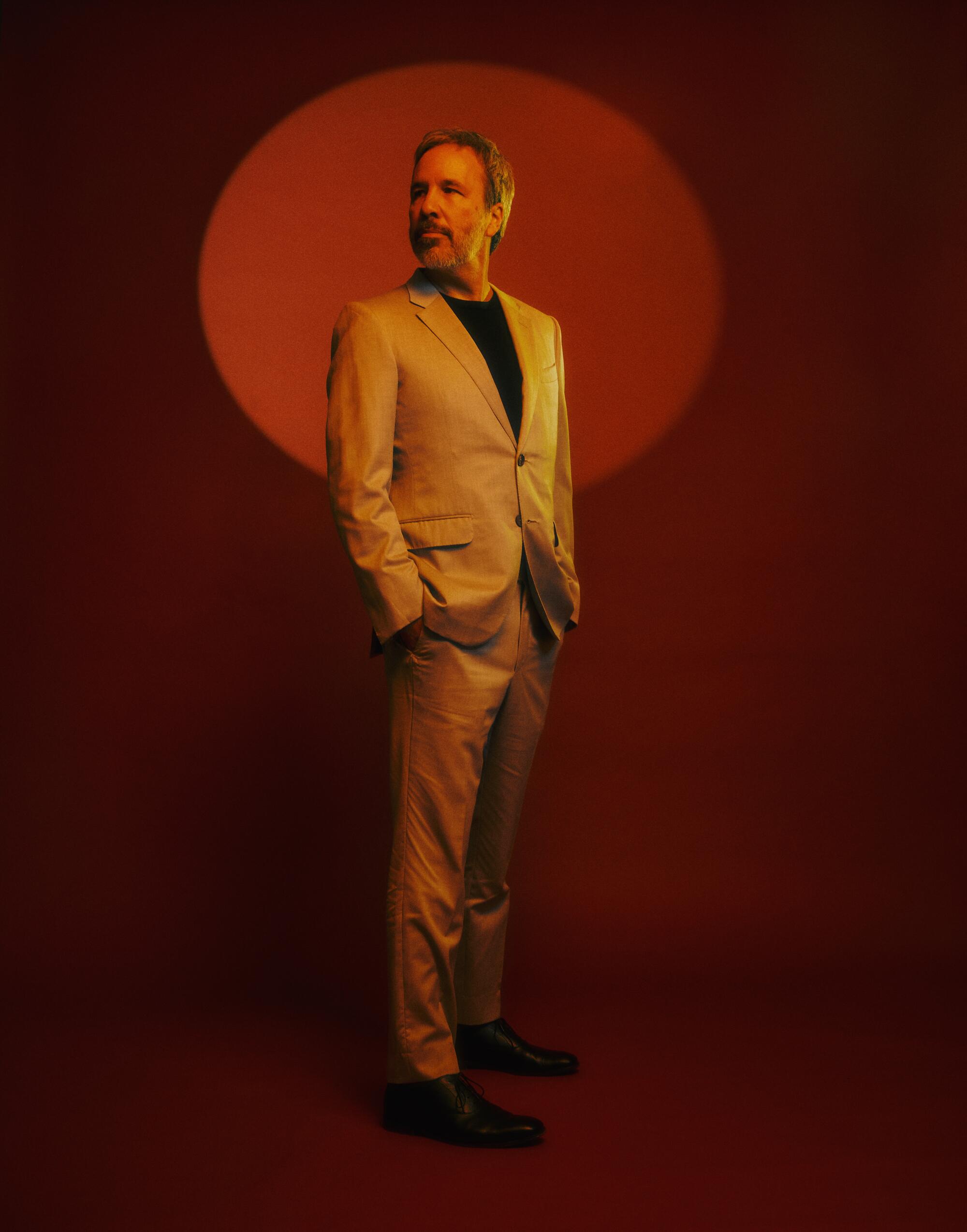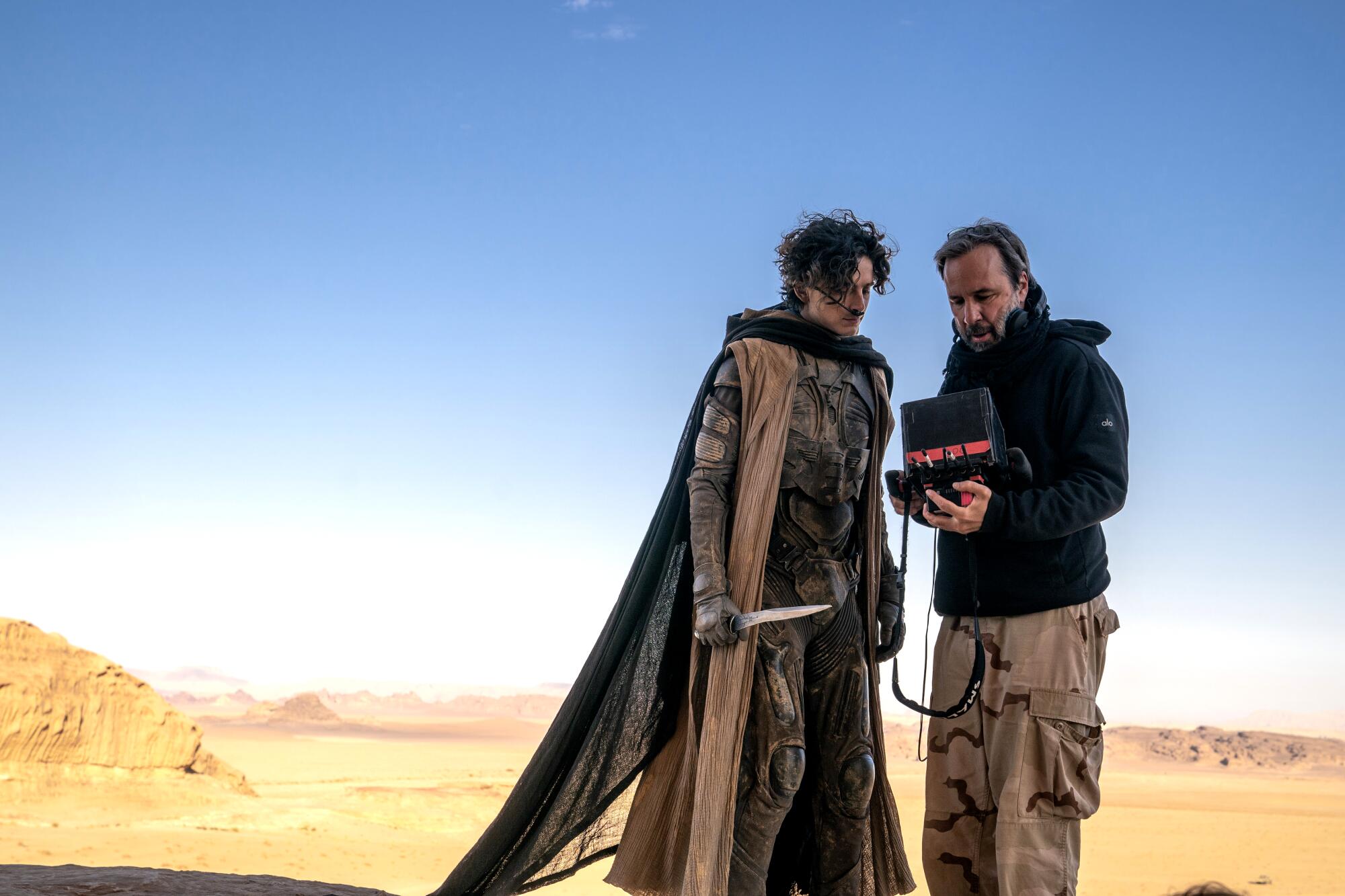Denis Villeneuve just ordered a short espresso, enough to reinvigorate his mind but not interfere with the nap he wants to take in a couple of hours. Looking around the restaurant patio at the Chateau Marmont, populated by folks famous and fame-adjacent, some whispering, others talking at a volume that seems less an invitation than a demand to eavesdrop, the filmmaker shakes his head and smiles.
“I always feel like I’m in Sofia Coppola’s territory when I come here,” he says, referring to Coppola’s 2010 movie “Somewhere,” set at the legendary Sunset Boulevard hotel.
Villeneuve is in L.A. to shake some hands and remind voters about his movie, “Dune: Part Two,” which came out nearly nine months ago, an eternity in the awards season timeline. The first “Dune” earned 10 Oscar nominations in 2022, winning six. Villeneuve picked up nods for writing and producing the best picture nominee but not for directing. He has been nominated as a director only for the 2016 sci-fi drama “Arrival,” a level of recognition that feels a little light.
“Dune” author Frank Herbert reportedly took some inspiration from his experiences with psychedelics, and more than a few people have seen the movies under the influence. What’s your experience with “spice”?
When I was young, I was obsessed with Jean Cocteau and the French poets who were under the influence of drugs when they were writing, trying to open doors of creativity. And I was really against that. In a very romantic way, I wanted to prove to myself that I could be creative without any external influence. I didn’t want to touch drugs for a very long time because I wanted to have a pure mind to achieve the intensity of creativity.
After all that Cocteau, you were never curious?
In my mid-20s, I tried, just for the fun of it. But I’m very sensitive. I never got into the buzz of it. It’s not healthy for me. I’m too fragile.
I remember you telling a story about your youngest son making some banana bread during the pandemic that speaks to that fragility.
[Laughs] The banana bread incident. That was during the pandemic. We were at home, and I wanted to get closer to my youngest. He had cooked that bread, and it was a very strong banana bread for sure. I remember having quite a bad trip. And I went deep into that bad trip, which actually turned out to be inspiring. It helped me direct Timothée Chalamet later when he was having the visions. I could explain the state I was looking for. It is good to experience things for yourself sometimes.
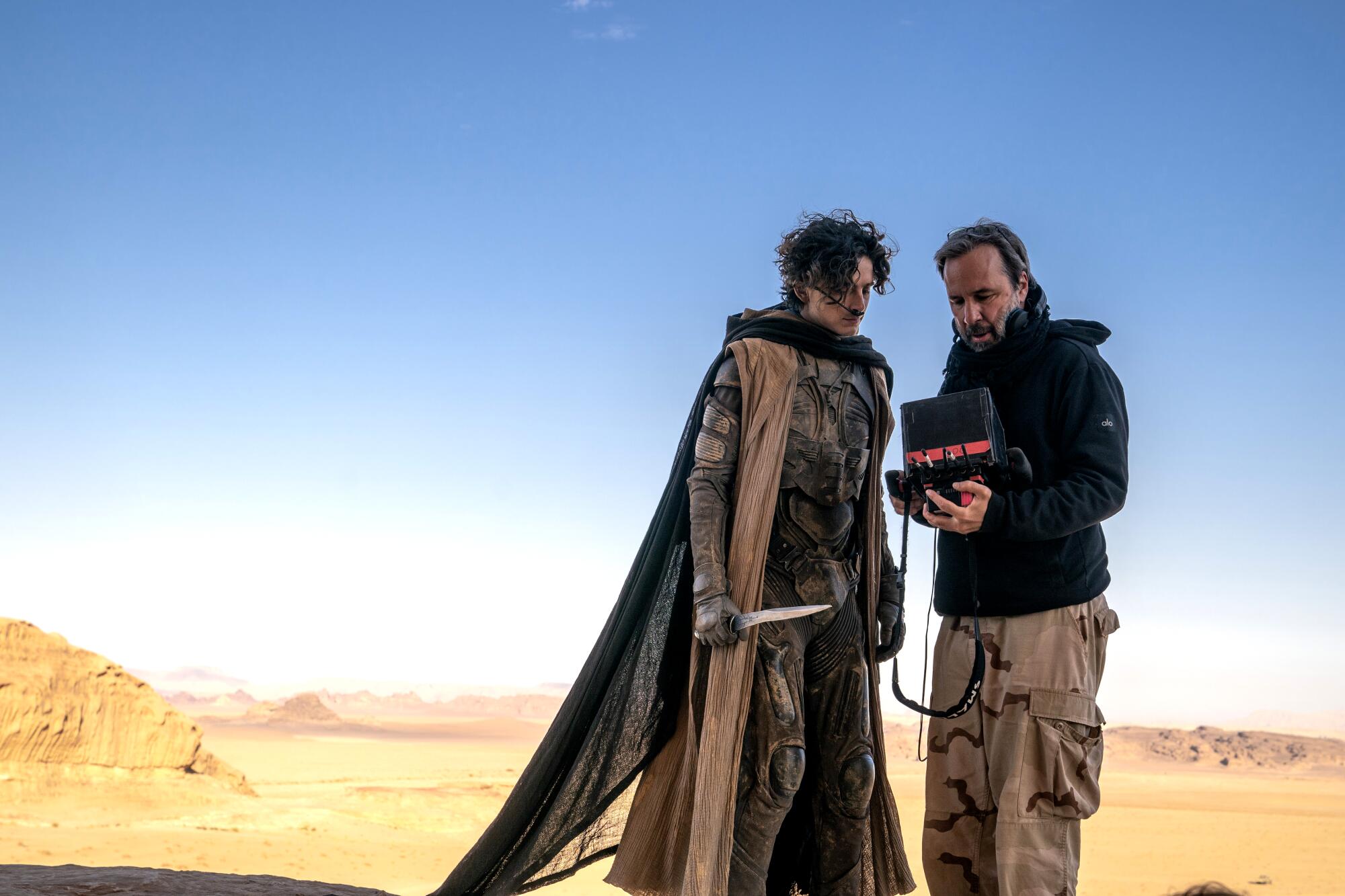
Timothee Chalamet and Denis Villeneuve consult on the set of “Dune: Part Two.”
(Niko Tavernise/Warner Bros. Pictures)
How do you access your subconscious mind when writing?
When I am on the edge of sleeping, there’s a moment when I can access the zone. Sometimes I take naps when I’m writing just to find that zone when the mind gets freed from reason and you start to drift close to the dream state. I love that.
What’s your ideal writing environment?
In the woods. We have a country house in the forest. What I love about Canada is that you can drive an hour out of Montreal and you’re in the wild. I absolutely adore silence. I love stillness. I could have easily … I was that close to spending my life watching a tree grow. Just meditate and watch a tree grow. That would have made sense to me.
So if you weren’t a filmmaker, that was Plan B?
There was a precise moment when I was in crisis when I was young, and I said to myself, “What is my Plan B? I have no Plan B! What if after I make two feature films they kick me out? What if I’m a bad filmmaker? What do I do?” And I thought, “A baker to make bread.” That made sense. People need bread. You make bread. They buy bread. It’s a very simple mathematical equation. Everybody is happy. When I was young, I had a friend who was a baker. His wife was absolutely beautiful. I thought, “That’s a life I can do.”
But the 7-year-old kid who watched the opening scene of “2001: A Space Odyssey” and felt the shock of it — and then had his parents tell him to go to bed — would have been disappointed.
Yes. You know, we had a two-floor house. When you had to go to bed, you climbed the stairs. But you could hide on the stairs and still watch the screen and wonder, “What the hell is happening?”
When were you allowed to finally watch the whole movie?
It was a movie that was always shown late, so it took me a couple of years. It was one of the rare films that promised something so huge and kept its promises, just growing and growing until the end when your jaw has dropped on the floor.
Do you feel like that’s a movie you could spend your whole career trying to make?
It is my holy grail. To make a movie that is so perfect and stands the test of time, that is my goal. Making movies, though, it is not easy. It’s quite intense.
Watching “Dune: Part Two” again, I feel like that opening sequence …
With the floating soldiers …
Yes! That’s something a kid watching from the stairs in his parents’ house could watch in wonder.
It’s very close to the dream I had when we designed that sequence. It taps into the subconscious. People often dream that they fly. Maybe we are all linked by dreams. I love [Carl] Jung’s story about communal space for dreams, that maybe we are linked in the psyche by archetypes. Maybe people like that sequence because it brings them back in a weird way to a sensation they have when dreaming.
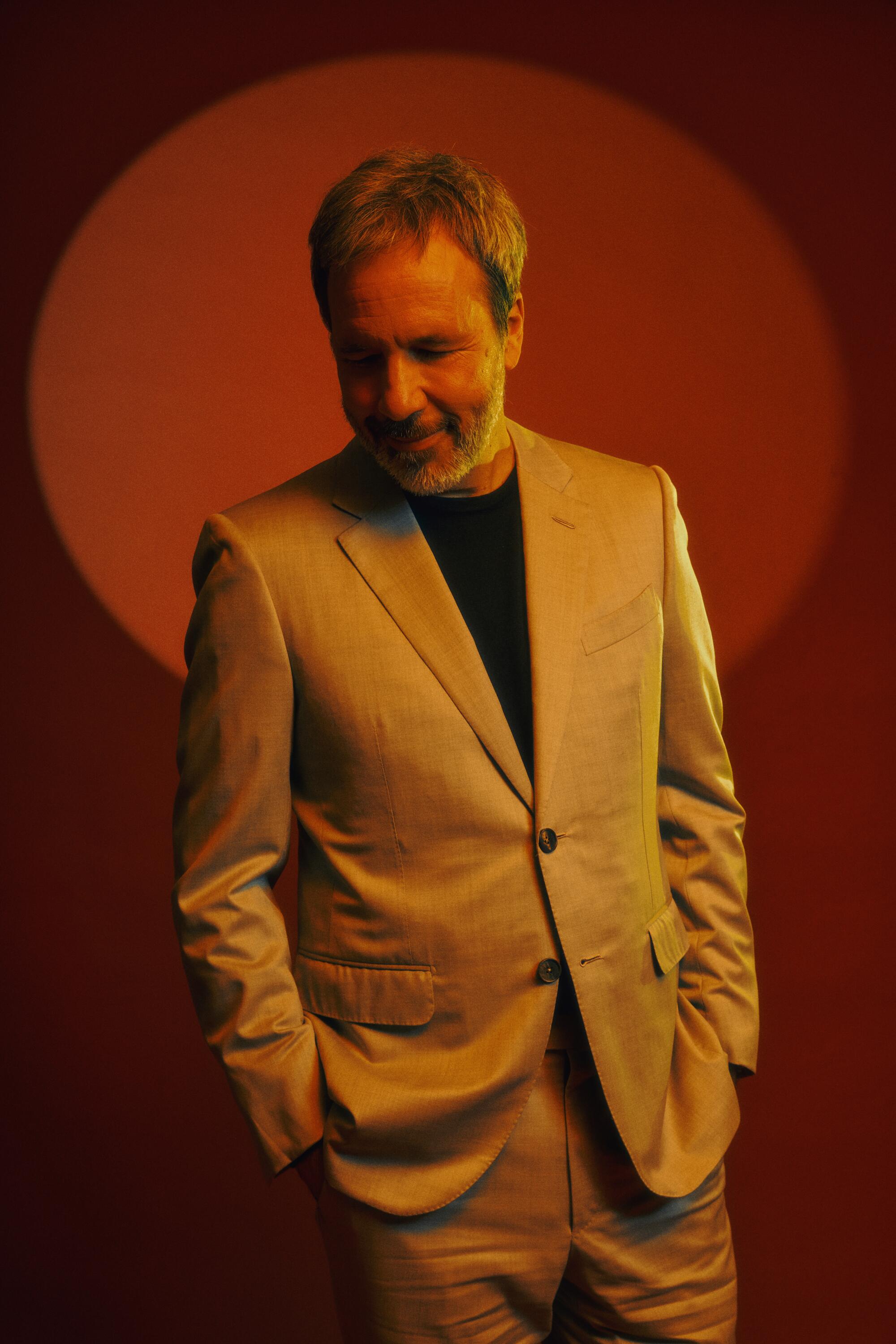
Is flying a recurring dream you have?
Yes. When I dream that I’m flying, I need to jump and use my arms as if I am swimming. It’s a very happy dream, very freeing. And that full opening sequence you mention, that was an homage to the sci-fi movies that I love from the ’70s, the use of the filter, that kind of eerie feeling that you are in contact with the unknown. I love the sensation of vertigo that it creates.
Growing up watching those movies and reading comics and science fiction, the idea of robot overlords enslaving humanity was always close at hand. Do you think we’re inching closer to that with AI?
I feel that human beings are ruled by algorithms right now. We behave like AI circuits. The ways we see the world are narrow-minded binaries. We’re disconnecting from each other, and society is crumbling in some ways. It’s frightening.
You looked at your phone while you were saying that. What’s your relationship with that device?
I’m like anybody. There’s something addictive about the fact that you can access any information, any song, any book. It’s compulsive. It’s like a drug. I’m very tempted to disconnect myself. It would be fresh air.
Do you put your phone away when writing?
Absolutely.
What about on set? Christopher Nolan bans cellphones.
Cinema is an act of presence. When a painter paints, he has to be absolutely focused on the color he’s putting on the canvas. It’s the same with the dancer when he does a gesture. With a filmmaker, you have to do that with a crew, and everybody has to focus and be entirely in the present, listening to each other, being in relationship with each other. So cellphones are banned on my set too, since Day 1. It’s forbidden. When you say cut, you don’t want someone going to his phone to look at his Facebook account.
What about chairs? There was this wild story, quickly debunked by his team, that Nolan barred chairs from his sets too.
[Laughs] I had not heard that. But when I did “Blade Runner,” I had a back problem because I was sitting a lot. So for the “Dune” movies, my cinematographer, Greig Fraser, and I decided to stand, to have minimal footprints so we could be flexible and go fast, to keep the blood flowing, to be awakened. No chairs for us. Maybe for the producers at the video village.
Someone asked you about Quentin Tarantino saying he didn’t need to see your “Dune” movies because, after the 1984 David Lynch film, he “didn’t need to see that story again.” And you said, “I agree. I don’t like this idea of recycling and bringing back old ideas” — which is what Tarantino does, quite well, in his movies. Was that response a sly way of throwing a little shade his way?
No, no. It was not. I was in front of a student audience, and a journalist asked me what I thought about Tarantino saying that. First of all, I have to say the truth. I don’t care. I don’t say that in a way to offend. I respect Tarantino, and I agree that Hollywood has a nostalgia to remake movies and sequels. I’m guilty. I did that with “Blade Runner.” But “Dune” is different because it’s an adaptation and totally disconnected from what had been done before. That’s where I disagree. But it’s a free country. He can say what he wants. I admire him as an artist.
What’s your favorite Tarantino film?
“Pulp Fiction.” I saw that in a theater with a full audience when it came out, and still to this day, I remember the excitement of seeing that new voice coming out into the world. Of course, he had “Reservoir Dogs” before, but I had not seen that.
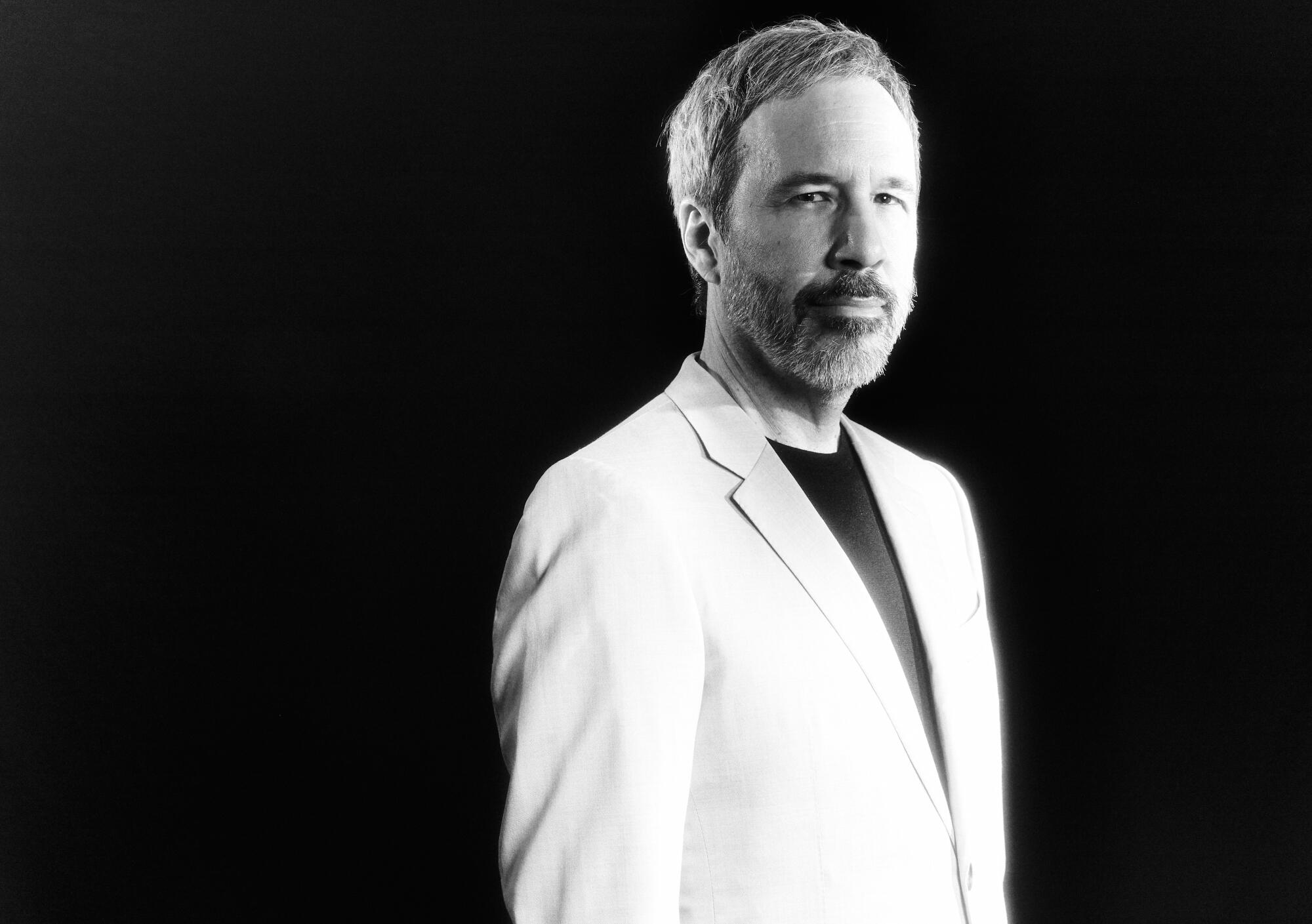
Spielberg was the first director you connected with as a young moviegoer. What about Scorsese? Between the desert setting and the reluctant messianic figure, there’s a connection between the “Dune” movies and “The Last Temptation of Christ.”
That exploration of doubt in the Christ figure deeply moves me, and the reconstruction of the time amazes me still. The production design and camerawork is stunning, and, yes, a big influence on the “Dune” movies. The color palette, the ambiences, the use of natural light. There’s something about the weight of the costumes and the dust that I remember vividly.
The dust, yes, because it speaks to why Christ washing the feet of the disciples was such an act of humility.
Their feet were dirty! And this idea of a figure who has been chosen against his own will, how this gift has become a burden, and that he has to choose if he will carry that burden, it’s a link to the story of Paul Atreides. And then the moment where he could abandon his fate, and come down from the cross, and go to Mary Magdalene and have a family, those ideas are provocative and beautiful. It’s one of my favorite Scorsese movies.
Your daughter, Salomé, is a filmmaker. When she chose to pursue that career, did she confide in you?
One evening, she said to me, “I need to talk to you. I want to tell you something important.” I was ready for anything. She said, “I need to do something. I will ask you to step out of my way, and I want you to do that. If I don’t try it, I will regret it the rest of my life. All my applications at university are in filmmaking. I want to become a filmmaker.” She was so gutsy. [Villeneuve laughs with appreciation.] “Get out of my way.” I was so proud of her.
Maybe the two of you will have a full–circle moment someday like the one you had with Spielberg where he was asking you about your shot choices in “Prisoners.”
That was surreal to have the master asking me questions. He’s a tremendously generous artist. I feel Steven is at peace. He has nothing to prove. He is an accomplished artist but still has the desire and appetite. I still study his filmmaking. It’s always a master class in directing.
Are you at peace?
No. I still have too much to learn.
You’re not ready to just go to the woods and watch the tree grow?
An old habit I have is every time I finish a movie, I ask myself, “Do I still feel the fire? Do I still feel the joy of cinema?” And if the answer is yes, then I am allowed to make another movie.
It sounds like the woods are going to have to wait.
We’ll see. [Villeneuve laughs softly.] One movie at a time.
